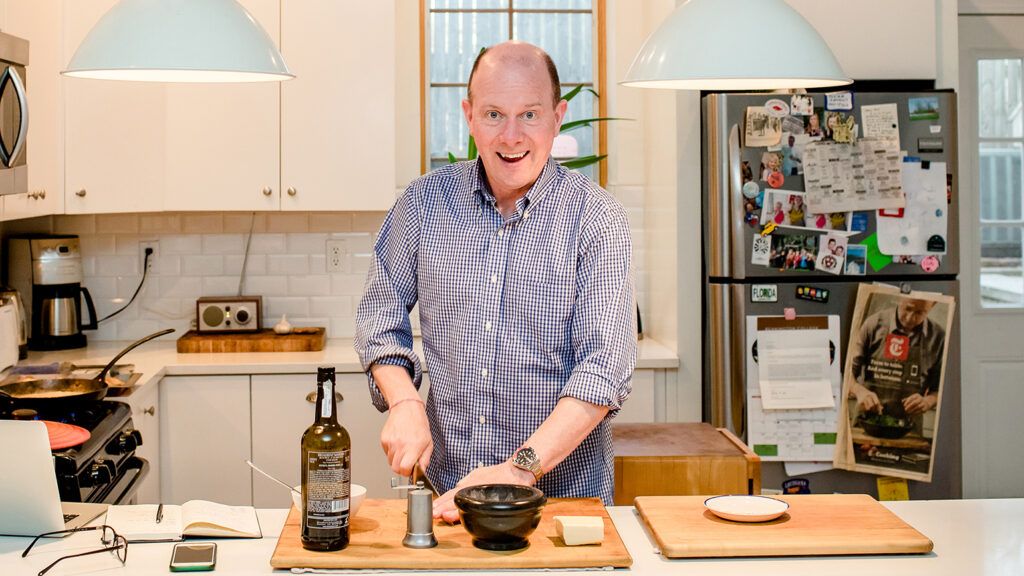This year’s holiday season is going to be a memorable one for all of us, if for nothing else because of the pandemic. The question is, will we remember it as a joyous season or one tinged with grief and sadness? I’m hoping that with care and intention, with empathy and understanding, we can keep it special.
In trying times like these, I find the Serenity Prayer especially useful. This heartfelt plea to God to grant us serenity, courage and wisdom was written by American theologian Reinhold Niebuhr, who was also my grandfather.
For me, cooking is a kind of service—to others, to community, to family. For years, I cooked Sunday suppers for my church in Brooklyn, big pots of pasta or stews for friends and strangers, a tradition that inspired my recent book, See You on Sunday.
The Christian church is built around the sacrament of the Eucharist, a commemoration of the Last Supper. In every religion, food is central: communion, Shabbos dinner, the feast after Ramadan. People are lonely, now more than ever, and they yearn to be part of something meaningful. Here’s how making and sharing food can make life better over the holidays.
Try Sam’s recipe for Pan-Roasted Chicken with Mint Sauce
Adapt your traditions. Is your family going to be scattered this year? There are still ways you can celebrate together. Technology will play a key role. Over Zoom or Skype, you and your loved ones can not only share the meal but cook it together, making the same dishes—stirring, chopping, roasting, baking as a group.
Pay particular attention to keeping family traditions alive, whether that’s trimming the tree, opening presents or baking Grandma’s apple pie. Watch the ball drop together and ring in the New Year with a virtual toast that 2021 will be a better year for everyone.
Deck the halls. Even if you find yourself having to celebrate alone, you should have a Christmas tree—and I don’t mean a sad little Charlie Brown tree. Go big: Hang wreaths, arrange lights and greenery, set up a crèche. And turn up the music! I find it difficult to be morose as I listen to Christmas carols while I’m cooking, even if I’m just cooking for myself.
Focus on flavor. I’ve heard from many readers of The New York Times, where I’m among other things the food editor and a former restaurant critic, how much confidence they’ve gained in the kitchen from having to cook at home for several months now. People who never used to bake are telling me, “I can make a pie crust from scratch now.”
At my house, we usually have a lot of people over for Christmas dinner—like, a lot. This year it will be just me, my wife and our two teenagers. But you know what? I’m going to lean into that and glory in turning out a wonderful meal for just the four of us.
Try Sam’s recipe for Roasted Potatoes with Onions and Rosemary
The trick is to concentrate on the flavors we associate with the season, then scale everything down. Instead of cooking a whole bird, I might bread and fry turkey cutlets. Serve them with mashed potatoes, a simple pan gravy, green beans and a bit of cranberry sauce.
You don’t have to whip up the usual vats of mashed potatoes; take four potatoes, cook them up, then mash them with butter, milk, salt and pepper—and you’re done. If you still want to tackle a large turkey, cook the thighs or breasts and freeze what you don’t cook for later.
Set the table with intention. People get nervous when I say that. They think I’m being fancy, but I’m not. It doesn’t matter if you bring out the good china and glassware—or even if you have good china and glassware; what matters is that everything is neat and looks as if it’s in the right place, even if things don’t match. If you can manage a cloth napkin and a nice tablecloth, that’s a great way of indicating that this is a meal unlike others.
There’s a ritual to setting the table that I love, and I think real magic lies in creating and maintaining these types of rituals. The most important thing is to never set your holiday table as an afterthought. Set it thoughtfully because you care about what will happen at it. It’s not just about eating. You’re sharing love and connection and fellowship.
Flowers and candles are great as long as they’re set low so they don’t get in the way of the food or people’s sight lines. And the best and most overlooked practice of holiday meal-making? Warming the plates. Warm plates are not fancy. They’re sensible. It makes all the difference. If you pour hot gravy on a cold plate, it just congeals.
You can put the plates in the oven on the lowest setting or on top of the stove near the heat escape vent, and turn them a couple times. Some dishwashers even have a simple warming function.
Count your blessings. A holiday rule of mine is to always offer thanks to one and all for being present and for helping out. When it comes to the official blessing, though, I wing it every time. It’s important to take a moment to reflect on what you’re thankful for and whatever truths you wish to acknowledge.
It’s always tough at the holidays to be missing lost loved ones, and Covid will make it even tougher for many this year. This is only my second Christmas without my mom. She was a very good cook. I will be cooking with her over my shoulder this year, giving me helpful notes.
I have faith in food and in the belief that we can all make this holiday a meaningful and joyous one, where we come together to celebrate the miracle of Christmas with the people we love. The world may be on fire, but we have each other. You say the blessing, I’ll carve, and we’ll get started.
Try Sam’s recipe for Honey-Roasted Sweet Potatoes With Yogurt Sauce
For more inspiring stories, subscribe to Guideposts magazine.





